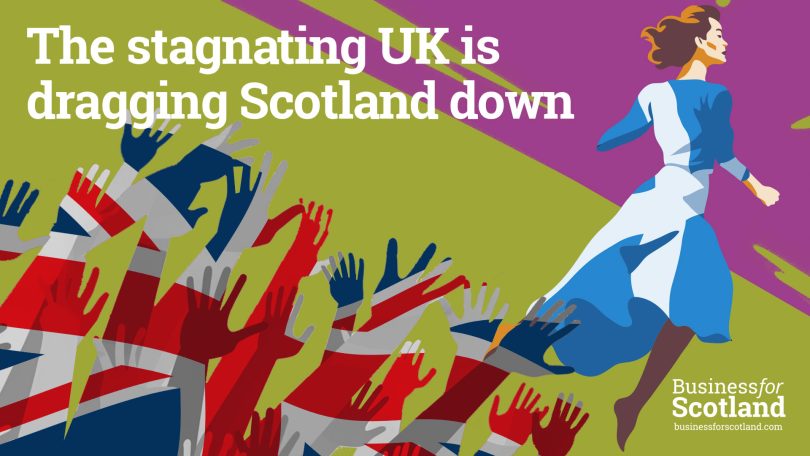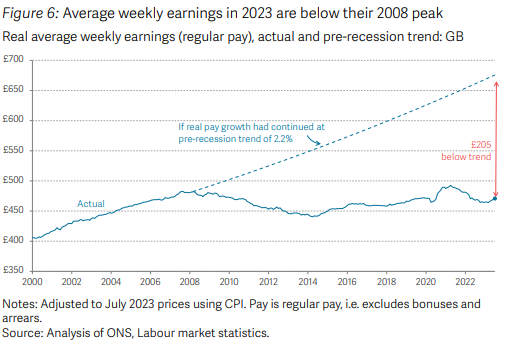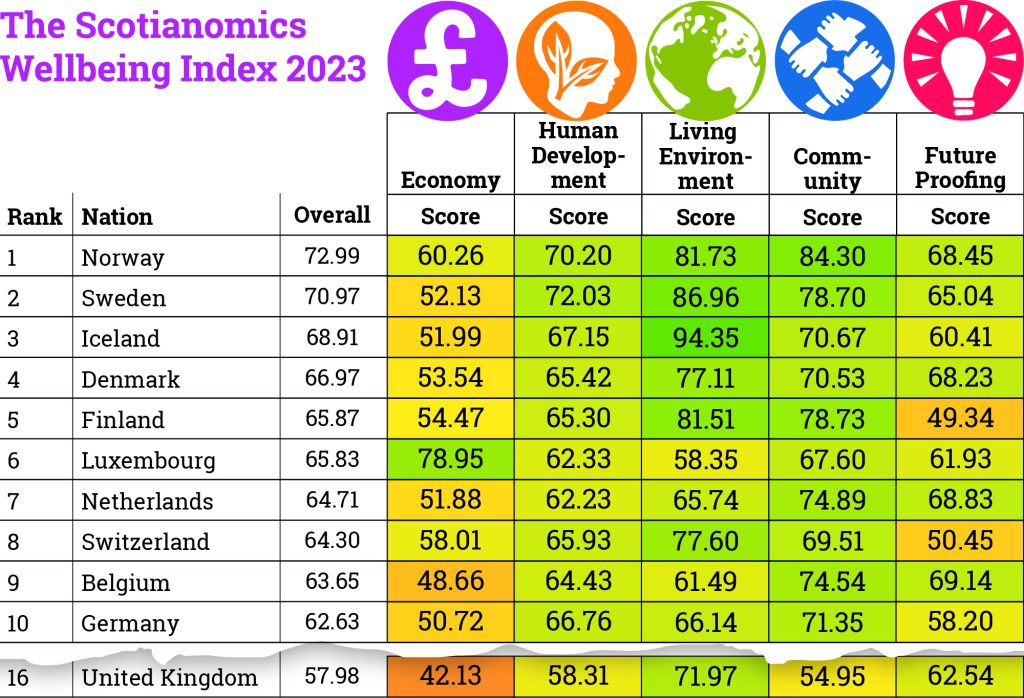A new paper released yesterday by the Resolution Foundation gives an in depth look at the depth of economic stagnation the UK economy has faced since the 2007/08 Financial Crisis. The paper offers a list of possible solutions to the UK’s frankly horrendous economic performance over the last decade and a half, including recommendations to increase public investment to levels more in line with other G7 countries. However, assumed Prime Minister in-waiting, Keir Starmer has said that anyone expecting Labour to “quickly turn on the spending taps” will be “disappointed”.
Scotland’s economic advantages have been squandered by the UK for too long. If we are to remedy the series of economic crises Scotland has suffered as part of the UK, then it will be through full control of all economic levers – using them to put Scotland on the path to renewed economic success through a wellbeing economy.
Britain’s Economic System is Broken
Having grown more quickly on average than most advanced economies from the 1990s to the mid-2000s, the UK economy has been in relative decline in the period since the Financial Crisis. Economic growth tends to slow as economies become more advanced but even compared to other advanced nations, the UK is in decline. The average production gap with France, Germany and the US doubled to 18% between 2008 and 2022.
Slow economic growth has resulted in flatlining wage growth. Mid-2023 saw wages returning back to where they were during the Financial Crisis, meaning UK workers have lived through 15 years of lost wages, accounting for £10,700 per year for the average worker.
During this time however, and since the 1980s, income inequality has been on the rise. In 2019 the UK had the highest income inequality of any large European country. Regional inequality is also seriously high: in 2021, all countries and regions of the UK had lower labour productivity than the UK average, except London and the South East. London was over 30% more productive than the UK average.
This is economic stagnation: high inequality coupled with low economic growth. It now means that middle-income earners in the UK are 20% poorer than their counterparts in Germany and 9% poorer than those in France. Worse still is that low-income UK households are now 27% poorer than their French and German counterparts – equivalent to £4,300 per year.
Young people in the UK are being hit particularly hard. Roughly nine million young workers have never experienced working life in an economy that has sustained rising average wages and as a result of that (along with rising house prices), young people are less than half as likely to own a home at the age of 30 as their parents’ generation.
So, What’s the Plan?
The Resolution Foundation posits ten key steps to ending the UK stagnation. These include: increasing public investment to 3% of GDP; investing in the UK’s second cities to bring their productivity back in line with the UK average; increasing the benefits level of the lowest income households to tackle persistent and high inequality. This is not an exhaustive list but they are the recommendations that will require the UK Government to increase its spending in some form in order to achieve.
However, this seems to be an avenue the Labour Party (favourites to win the next General Election) are reluctant to go down, leaving the UK economy staring down the barrel of another decade and a half of stagnation and decline.
Scotland Can Forge Another Path
We have written previously about the UK and Scotland’s divergent economic priorities. While the UK remains a growth obsessed, Brexit based economy; Scotland is seeking to establish a wellbeing economy – an economy that gives quality of life, equality, fairness, happiness and health the same weight in economic decision making as GDP growth.
Economic growth will remain an integral part of enhancing wellbeing, but it will no longer be the sole pursuit of government, rather a dimension of wellbeing to be balanced with others.
The Scottish Government has already committed to walking the path to a wellbeing economy but it is, like in many things, constrained by the limited powers of devolution. With the full powers of an independent nation, Scotland can refocus our economy to enhance human wellbeing, through which all else will follow.
The Scotianomics 2023 Wellbeing Index measures how well 33 OECD nations stack up to the tenets of the Wellbeing Economic Approach. This Approach is measured across five dimensions:
- Economy
- Human Development
- Living Environment
- Community
- Future Proofing
Here are the top ten in the list compared with the UK (in 16th place) You can see the complete table of all 33 countries in the full report here. The Index makes use of a traffic light system: the darker the green is, the stronger the score.
With sometimes dozens of measures within each dimension, it presents a more robust measure of what nations are further along their journey towards a wellbeing economy.
The first thing that jumps out is that the top ten is dominated by small to medium sized Northern European nations. Nordic/Scandinavian nations with similar sized populations to Scotland dominate the top five of the index.
Conclusion
Britain’s economy is in decline and has been since the 2007/8 Financial Crisis. Economic stagnation coupled with effectively zero real wage growth and skyrocketing income inequality has led the UK down a dark path of declining living standards and Scotland has been dragged down with it.
Economic change looks unlikely from either of the two main parties and with Labour widely considered a shoo-in at the next General Election, Keir Starmer’s comments show us that he intends to bring zero economic change to the table as PM.
Scotland only has one option if we are to improve our economic situation and find ourselves climbing the Scotianomics Wellbeing Index. We are already on the path to a wellbeing economy, however, the limited powers offered to us through devolution are significantly holding us back. Through independence we can create a better, fairer, greener, wealthier, healthier, happier and more successful Scotland.










